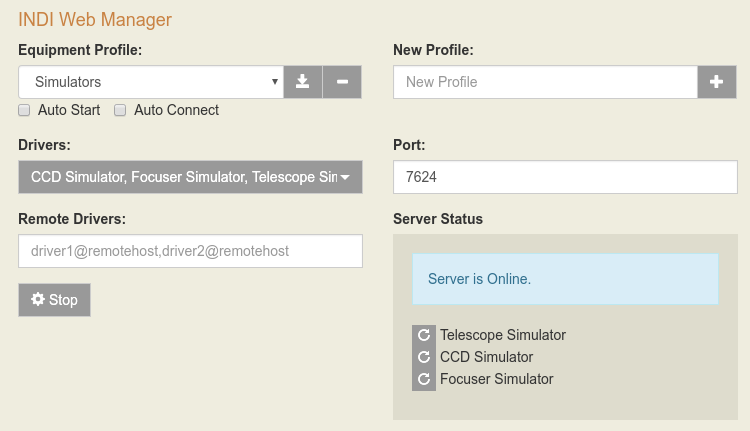INDI Web Manager is a simple Web Application to manage INDI server. It supports multiple driver profiles along with optional custom remote drivers. It can be used to start INDI server locally, and also to connect or chain to remote INDI servers.
The Web Application is based on Bottle Py micro-framework. It has a built-in webserver and by default listens on port 8624.
Before installing the indiweb package, make sure the INDI library is installed on the target system.
You can install the indiweb Python package using pip:
$ pip install indiweb
You may want to install it system-wide, only in your user account or even into a virtual environment (if you are a developer).
If you want to install it system-wide, you will have to invoke pip with superuser rights:
$ sudo pip install indiweb
After installing the indiweb package, the command indi-web will be available in your sytem PATH.
You can obtain help about the indi-web command by invoking:
$ indi-web -h
The INDI Web Manager runs as a standalone web server. It can be started manually by invoking:
$ indi-web -v
Then using your favorite web browser, go to http://localhost:8624 if the INDI Web Manager is running locally. If the INDI Web Manager is installed on a remote system, simply replace localhost with the hostname or IP address of the remote system.
If you selected any profile as Auto Start then the INDI server shall be automatically started when the service is executed at start up.
The provided file indiwebmanager.service is an example systemd service file
that can be used to run indi-web as pi user. If your username is different
please edit the file and change the username first.
Copy your preferred service file to /etc/systemd/system:
sudo cp indiwebmanager.service /etc/systemd/system/
sudo chmod 644 /etc/systemd/system/indiwebmanager.service
Now configure systemd to load the service file during boot:
sudo systemctl daemon-reload
sudo systemctl enable indiwebmanager.service
Finally, reboot the system for your changes to take effect:
sudo reboot
After startup, check the status of the INDI Web Manager service:
sudo systemctl status indiwebmanager.service
If all appears OK, you can start using the Web Application using any browser.
The Web Application provides a default profile to run simulator drivers. To use a new profile, add the profile name and then click the plus button. Next, select which drivers to run under this particular profile. After selecting the drivers, click the Save icon to save all your changes. To enable automatic startup of INDI server for a particular profile when the device boots up or when invoked manually via the systemctl command, check the Auto Start checkbox.
INDI Web Manager provides a RESTful API to control all aspects of the application. Data communication is via JSON messages. All URLs are appended to the hostname:port running the INDI Web Manager.
| URL | Method | Return | Format |
|---|---|---|---|
| /api/server/status | GET | INDI server status (running or not) | {'server': bool, 'active_profile': profile_name} |
Example: curl http://localhost:8624/api/server/status Reply: [{"status": "False"}, {"active_profile": ""}]
TODO
| URL | Method | Return | Format |
|---|---|---|---|
| /api/server/stop | POST | None | [] |
| URL | Method | Return | Format |
|---|---|---|---|
| /api/server/drivers | GET | Returns an array for all the locally running drivers | {'driver': driver_executable} |
Example: curl http://localhost:8624/api/server/drivers Reply: [{"driver": "indi_simulator_ccd"}, {"driver": "indi_simulator_telescope"}, {"driver": "indi_simulator_focus"}]
| URL | Method | Return | Format |
|---|---|---|---|
| /api/profiles/ | POST | None | None |
To add a profile named foo:
curl -H "Content-Type: application/json" -X POST http://localhost:8624/api/profiles/foo
| URL | Method | Return | Format |
|---|---|---|---|
| /api/profiles/ | DELETE | None | None |
To delete a profile named foo:
curl -X DELETE http://localhost:8624/api/profiles/foo
| URL | Method | Return | Format |
|---|---|---|---|
| /api/profiles | GET | Returns all profiles | [{"port": number, "id": ID, "autostart": number, "name": profile_name}, ...] |
Example: curl http://localhost:8624/api/profiles Reply: [{"port": 7624, "id": 1, "autostart": 0, "name": "Simulators"}, {"port": 7624, "id": 2, "autostart": 0, "name": "EQ5"}]
Jasem Mutlaq (mutlaqja@ikarustech.com)
Juan Menendez (juanmb@gmail.com)
